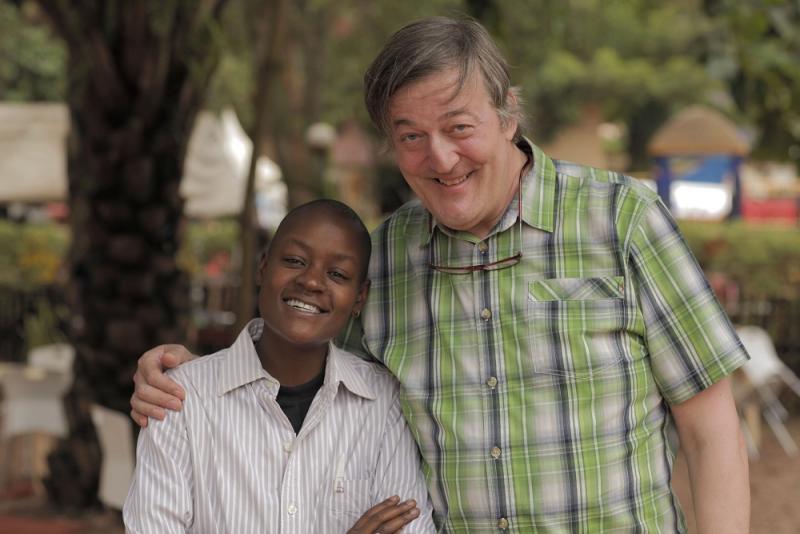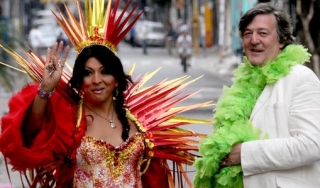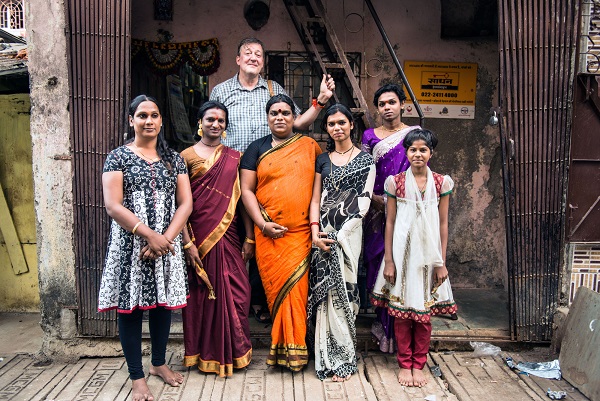Stephen Fry: Out There, BBC Two | reviews, news & interviews
Stephen Fry: Out There, BBC Two
Stephen Fry: Out There, BBC Two
A sympathetically presented picture of the difficulties of gay life around the world

Respect and dignity, intolerance and hatred: the poles were set far apart in Stephen Fry: Out There. It’s good to have Fry the thoughtful presenter back – it’s been a long time since his The Secret Life of the Manic Depressive – on a subject close to his heart, how gay people are faring in various parts of the world. This first episode took us to Uganda and Los Angeles, while part two on Wednesday drops in on Brazil, Russia and India.
We alternated between the human beings, each with their often heartrending stories, confronting the issues of growing up gay in societies where they face varying degrees of intolerance, and the assortment of lawmakers and churchmen seeking to ratchet up that intolerance. Fry’s empathy with the former contrasted with his impatience with the latter, as he initially looked for, and then finally gave up trying to find, any shared ground for debate. There was Uganda’s Minister of so-called Ethics and Integrity, who’s trying to introduce a bill (on top of existing colonial laws outlawing homosexuality) that would make it criminal not to report any acquaintance if you thought he or she was gay, and the Kampala pastor with whom Fry shared a radio show, who was unstoppably graphic about the detrimental anatomical effects of homosexuality.
Fry narrated it through the prism of his own lifetime, which has seen Britain move from homosexuality ceasing to be a crime to civil marriage
As Fry confronted this man of God brandishing a newspaper with the headline, “How bum-shafting shattered my whopper”, it approached the most absurd comedy. Except that there wasn’t anything remotely funny when Fry met the diminutive, tough-as-anything Stosh (main picture, above). Raped at the age of 14 to “cure” her of her lesbian tendencies, Stosh ended up both pregnant and infected with HIV. We don’t learn to whom Stosh turned to regain the remarkable poise she showed here, but it must have been to somewhere like Ice Breakers, an informal (and completely underground) meeting group which offered both psychological and medical advice, but no less important for providing a fragile sense of community for young people desperately in need of it. Blessed are the peacemakers.
If what Stosh went through in Uganda was called “corrective rape”, in America it’s known as “reparative therapy” – the same attempt to push gay people, often young, out of their sexual orientation. Fry met its slick practitioner Joseph Nicolosi who aims to “resolve” such emotional conflicts, though none of his “patients” were willing to talk about the result. The one we thought was appearing in that capacity, Dan, had gone full cycle to “ex-ex-gay”, and abandoned his religious faith in the process. His mother’s verdict on Nicolosi: “He should be ashamed of himself.”
But the trials of asserting your gay identity in prosperous Los Angeles jarred after the horrors of Uganda, and Out There lost focus – too many artily shot palm trees, too much of its presenter in a natty sports coupé. Interesting in its way no doubt, and all respect to those concerned, but was this really the right context to learn how an ex-boy band member was dealing with the problems of presenting himself for a possible acting career?
 Fry narrated it all through the prism of his own lifetime, which has seen Britain move from homosexuality ceasing to be a crime in 1967, through to civil partnership by the time the programme started (and civil marriage by the time it ended). But was the interview with Elton John and partner David Furnish, like much of the American excursion, there to encourage viewers for whom such stories – from lands of which we know little, about people we otherwise only encounter as newspaper statistics – might be a switch-off, even on BBC Two? It seemed a bit like it.
Fry narrated it all through the prism of his own lifetime, which has seen Britain move from homosexuality ceasing to be a crime in 1967, through to civil partnership by the time the programme started (and civil marriage by the time it ended). But was the interview with Elton John and partner David Furnish, like much of the American excursion, there to encourage viewers for whom such stories – from lands of which we know little, about people we otherwise only encounter as newspaper statistics – might be a switch-off, even on BBC Two? It seemed a bit like it.
Stick with it, though: Out There becomes much more compelling in part two, and as Fry says, “behind every statistic is a beating human heart.” Brazil and Russia seem to be in “third step” territory. In Brazil, it’s three steps forward, two back, with the world’s biggest Gay Pride (pictured above right), but also the truly tragic story of a 14-year-old boy killed for his sexuality, and the echoing creepy laughter of a Rio senator. Russia looks the opposite – one step forward, three back: Pride or any other such march banned, new legislation outlawing any “propaganda” that may "affect" minors, and similar bigotry from church-influenced lawmakers (plus liberals from the Nineties now in the conservative vanguard).
 India, or at least Bombay – Fry admits these were only brief snapshots from each country – was more encouraging, newly rid of Victorian-era laws. Its stories were about families, and if your blood one has rejected you, then, like the Hijra caste Fry encountered (pictured above left, with the proud mother-figure Gauri, centre), make your own. There was even the apparently unscripted discovery, on an absolutely nondescript street, of a gay boutique that wouldn’t look out of place in Soho. Given this is television, we may not entirely believe in such “chance” encounters. But somehow we did believe in the rest of what Fry showed us, even if it sometimes hurt to watch.
India, or at least Bombay – Fry admits these were only brief snapshots from each country – was more encouraging, newly rid of Victorian-era laws. Its stories were about families, and if your blood one has rejected you, then, like the Hijra caste Fry encountered (pictured above left, with the proud mother-figure Gauri, centre), make your own. There was even the apparently unscripted discovery, on an absolutely nondescript street, of a gay boutique that wouldn’t look out of place in Soho. Given this is television, we may not entirely believe in such “chance” encounters. But somehow we did believe in the rest of what Fry showed us, even if it sometimes hurt to watch.
rating
Share this article
Add comment
The future of Arts Journalism
You can stop theartsdesk.com closing!
We urgently need financing to survive. Our fundraising drive has thus far raised £49,000 but we need to reach £100,000 or we will be forced to close. Please contribute here: https://gofund.me/c3f6033d
And if you can forward this information to anyone who might assist, we’d be grateful.

Subscribe to theartsdesk.com
Thank you for continuing to read our work on theartsdesk.com. For unlimited access to every article in its entirety, including our archive of more than 15,000 pieces, we're asking for £5 per month or £40 per year. We feel it's a very good deal, and hope you do too.
To take a subscription now simply click here.
And if you're looking for that extra gift for a friend or family member, why not treat them to a theartsdesk.com gift subscription?
more TV
 Murder Before Evensong, Acorn TV review - death comes to the picturesque village of Champton
The Rev Richard Coles's sleuthing cleric hits the screen
Murder Before Evensong, Acorn TV review - death comes to the picturesque village of Champton
The Rev Richard Coles's sleuthing cleric hits the screen
 Black Rabbit, Netflix review - grime and punishment in New York City
Jude Law and Jason Bateman tread the thin line between love and hate
Black Rabbit, Netflix review - grime and punishment in New York City
Jude Law and Jason Bateman tread the thin line between love and hate
 The Hack, ITV review - plodding anatomy of twin UK scandals
Jack Thorne's skill can't disguise the bagginess of his double-headed material
The Hack, ITV review - plodding anatomy of twin UK scandals
Jack Thorne's skill can't disguise the bagginess of his double-headed material
 Slow Horses, Series 5, Apple TV+ review - terror, trauma and impeccable comic timing
Jackson Lamb's band of MI5 misfits continues to fascinate and amuse
Slow Horses, Series 5, Apple TV+ review - terror, trauma and impeccable comic timing
Jackson Lamb's band of MI5 misfits continues to fascinate and amuse
 Coldwater, ITV1 review - horror and black comedy in the Highlands
Superb cast lights up David Ireland's cunning thriller
Coldwater, ITV1 review - horror and black comedy in the Highlands
Superb cast lights up David Ireland's cunning thriller
 Blu-ray: The Sweeney - Series One
Influential and entertaining 1970s police drama, handsomely restored
Blu-ray: The Sweeney - Series One
Influential and entertaining 1970s police drama, handsomely restored
 I Fought the Law, ITVX review - how an 800-year-old law was challenged and changed
Sheridan Smith's raw performance dominates ITV's new docudrama about injustice
I Fought the Law, ITVX review - how an 800-year-old law was challenged and changed
Sheridan Smith's raw performance dominates ITV's new docudrama about injustice
 The Paper, Sky Max review - a spinoff of the US Office worth waiting 20 years for
Perfectly judged recycling of the original's key elements, with a star turn at its heart
The Paper, Sky Max review - a spinoff of the US Office worth waiting 20 years for
Perfectly judged recycling of the original's key elements, with a star turn at its heart
 The Guest, BBC One review - be careful what you wish for
A terrific Eve Myles stars in addictive Welsh mystery
The Guest, BBC One review - be careful what you wish for
A terrific Eve Myles stars in addictive Welsh mystery
 theartsdesk Q&A: Suranne Jones on 'Hostage', power pants and politics
The star and producer talks about taking on the role of Prime Minister, wearing high heels and living in the public eye
theartsdesk Q&A: Suranne Jones on 'Hostage', power pants and politics
The star and producer talks about taking on the role of Prime Minister, wearing high heels and living in the public eye
 King & Conqueror, BBC One review - not many kicks in 1066
Turgid medieval drama leaves viewers in the dark
King & Conqueror, BBC One review - not many kicks in 1066
Turgid medieval drama leaves viewers in the dark
 Hostage, Netflix review - entente not-too-cordiale
Suranne Jones and Julie Delpy cross swords in confused political drama
Hostage, Netflix review - entente not-too-cordiale
Suranne Jones and Julie Delpy cross swords in confused political drama

Comments
I felt that Stephen Fry went
You make a fair point there
I did wonder about that gay